上海牛津小学英语语法知识总结(最新整理)
- 格式:pdf
- 大小:206.75 KB
- 文档页数:8
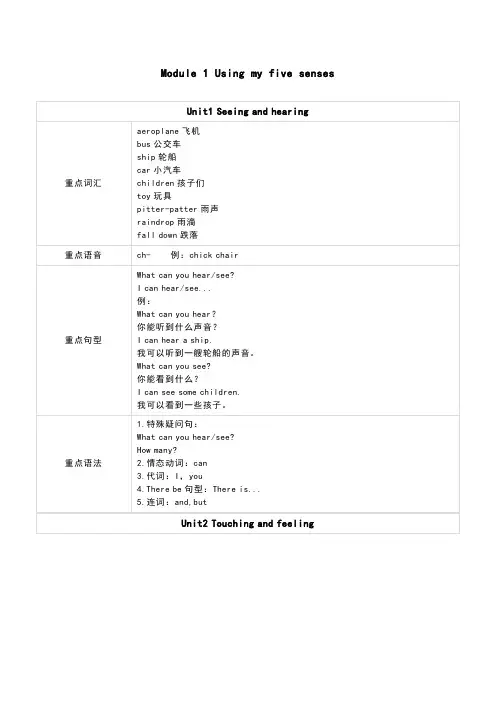
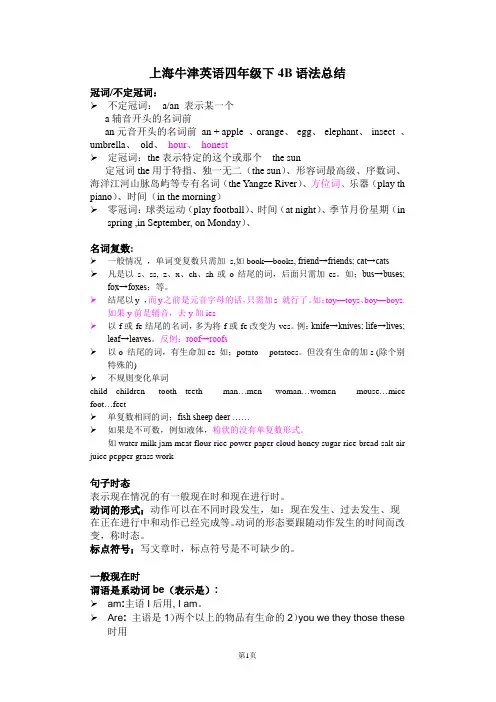
上海牛津英语四年级下4B语法总结冠词/不定冠词:➢不定冠词:a/an 表示某一个a辅音开头的名词前an元音开头的名词前an + apple 、orange、egg、elephant、insect 、umbrella、old、hour、honest➢定冠词:the表示特定的这个或那个the sun定冠词the用于特指、独一无二(the sun)、形容词最高级、序数词、海洋江河山脉岛屿等专有名词(the Yangze River)、方位词、乐器(play th piano)、时间(in the morning)➢零冠词:球类运动(play football)、时间(at night)、季节月份星期(in spring ,in September, on Monday)、名词复数:➢一般情况,单词变复数只需加s,如book—books, friend→friends; cat→cats➢凡是以s、ss, z、x、ch、sh或o结尾的词,后面只需加es。
如;bus→buses;fox→foxes;等。
➢结尾以y ,而y之前是元音字母的话,只需加s 就行了。
如;toy—toys、boy—boys.如果y前是辅音,去y加ies➢以-f或-fe结尾的名词,多为将-f或-fe改变为-ves。
例:knife→knives; life→lives;leaf→leaves。
反例:roof→roofs➢以o 结尾的词,有生命加es 如;potato--- potatoes。
但没有生命的加s (除个别特殊的)➢不规则变化单词child---children tooth---teeth man…men woman…women mouse…mice foot…feet➢单复数相同的词;fish sheep deer ……➢如果是不可数,例如液体,粉状的没有单复数形式。
如water milk jam meat flour rice power paper cloud honey sugar rice bread salt air juice pepper grass work句子时态表示现在情况的有一般现在时和现在进行时。
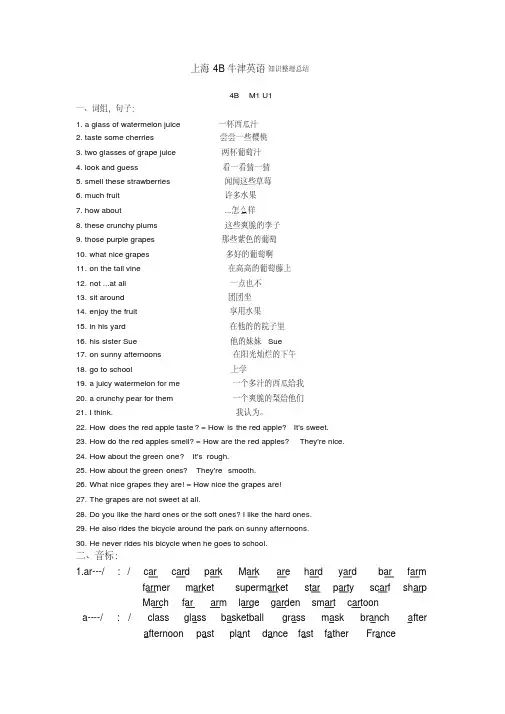
上海4B牛津英语知识整理总结4B M1 U1一、词组,句子:1.a glass of watermelon juice 一杯西瓜汁2.taste some cherries 尝尝一些樱桃3.two glasses of grape juice 两杯葡萄汁4.look and guess 看一看猜一猜5.smell these strawberries 闻闻这些草莓6.much fruit 许多水果7.how about ...怎么样8.these crunchy plums 这些爽脆的李子9.those purple grapes 那些紫色的葡萄10.what nice grapes 多好的葡萄啊11.on the tall vine 在高高的葡萄藤上12.not ...at all 一点也不13.sit around 团团坐14.enjoy the fruit 享用水果15.in his yard 在他的的院子里16.his sister Sue 他的妹妹Sue17.on sunny afternoons 在阳光灿烂的下午18.go to school 上学19.a juicy watermelon for me 一个多汁的西瓜给我20.a crunchy pear for them 一个爽脆的梨给他们21.I think. 我认为。
22.How does the red apple taste? = How is the red apple? It's sweet.23.How do the red apples smell? = How are the red apples? They're nice.24.How about the green one? It's rough.25.How about the green ones? They're smooth.26.What nice grapes they are! = How nice the grapes are!27.The grapes are not sweet at all.28.Do you like the hard ones or the soft ones? I like the hard ones.29.He also rides the bicycle around the park on sunny afternoons.30.He never rides his bicycle when he goes to school.二、音标:1.ar---/ ɑ: / car card park Mark are hard yard bar farmfarmer market supermarket star party scarf sharpMarch far arm large garden smart cartoona----/ ɑ: / class glass basketball grass mask branch after afternoon past plant dance fast father France2. u ---- / u: / blue glue true Sue ruler ruleui ----/ u: / fruit juice juicyo----- / u: / do to who whoseoo----/ u: / afternoon school cool moon room smooth food tooth zoo soon spoon noodles cartoon choose tooroot balloon三、短文诵读:Sour grapesOne day, a fox is thirsty. He is looking for (寻找)some water. Then he sees some bunches of grapes on the tall vine. The grapes are purple and r ound. They’re smooth and soft. What nice grapes! The fox looks at the grapes. He thinks the grapes are sweet and juicy. He wants them. The fox jumps and jumps. But he can’t touch the grapes.Suddenly(突然)a bird is coming. She sees the grapes too. She flies to the grapes and eats the grapes happily. The fox is angry:“These are my grapes! Go away!”The bird says:“Haha! You can’t fly high and enjoy(享受)the nice grapes. So they are my grapes.”The fox is envious /'envi?s/ (嫉妒的). “Oh! Those grapes are sour. They are not sweet at all!” Then the fox goes away.4B M1 U2一、词组,句子:1.whose knife 谁的小刀2.these blunt knives 这些钝的小刀3.those sharp pencils 那些锋利的铅笔4.Jill's pencil case Jill的铅笔盒5.many thick books 许多厚的书6.some thin books 一些薄的书7.walk on the beach 在海边走8.Kitty and her parents Kitty和她的父母亲9.much soft sand 许多软的沙子10.take off her shoes 脱下她的鞋子11.put on their coats 穿上他们的外套12.of course 当然可以13.the key to the door 开门的钥匙14.the key to the question 问题的答案15.the man over there 在那里的男子16.take the key to the lost-property office 失物招领处17.the blind brothers 盲兄弟18.touch the elephant 碰碰象19.one of the pupils 学生中的一个20.another brother 另一个兄弟21.smooth and hard 又光滑又硬22.big and thick 又大又厚23.the last blind boy 最后一个失明的男孩24.say about the elephant 说说大象25.some fruit for him 给他的一些水果26.some drinks for her 给她的一些饮料27.in the school yard 在学校的院子里28.a slim girl 一个苗条的女孩29.a red new skirt 一条新的红裙子30.too small 太小31.find her purse 找到她的小包32.on the floor 在地板上33.behind the door 在门后34.want to do sth. 想要做某事35.her cousin Laura 她的表妹Laura36.give sth. to sb. = give sb. sth. 把某物给某人37.take sth. to sb. = take sb. sth. 拿某物给某人38.Give the thin book to Grandma. = Give Grandma the thin book.39.Take the key to the lost-property office.40.How does the pineapple feel? = How is the pineapple? It's rough and hard.41.How do the pillows feel? = How are the pillows? They're soft.42.Whose books are those? = Whose are those books? They're Miss Fang's.43.What's the matter with you? = What's wrong with you?44.There's something in the sand.45.Here comes a man on an elephant.46.The brothers can hear the elephant, but they cannot see it.47.' It's an elephant,' answers the man, ' You can touch it. How does it feel? '48.' It's over there,' says her mum, ' Just behind the door!'49.She wants to buy a new purse.50.He likes eating and drinking. = He likes to eat and drink.二、音标:1. ir /?:/shirt bird third thirsty first girl skirt birthdayur /?:/purse nurse Thursdayer /?:/her certainly(当然) term (学期)or /?:/work worker world wordear /?:/ early learn2. au /?:/ warm war quarter 一刻钟al /?:/ all ball call fall hall small tall walk always aw /?:/draw strawberry prawn虾au /?:/August autumn daughter 女儿because Laura oor /?:/door floorour /?:/your four fourteenore /?:/ more before4BM1 U3一、词组,句子:1.behind the hill 在小山丘后面2.the tree’s shadow 树的影子3.on the lawn 在草坪上4.at noon 正午5.high in the sky 高高挂在天上6.grow short 变短7.these benches 这些长凳8.go up = rise 升起9.go down = set 落下10.grow long again 又变长11.on the path 在小路上12.cut them out 把它们剪下来13.stick a pencil 黏上铅笔14.shine the torch 打开手电筒15.turn on the torches 打开手电筒16.at seven o’clock in the morning 在上午七点17.go with me 跟我走18.stay behind me 呆在我后面19.walk in front of him 走在我前面20.take a walk 散步21.go to work 上班22.grow big and strong 变得又大又强壮23. a beautiful sunny day 一个美丽的好天24.walk down the road 沿着小路向下走25.hear a sound 听见一种声音26.look back 回头看27. a black shape 一个黑色的图形28.bite her 咬她29.be afraid of the dog 害怕狗30.run away 逃走31.follow them 跟着他们32.play together 一起玩33.play with the shadow 玩影子34.run after 跟着跑,追赶35. a big black dog 一个大黑狗36.go off 消失37.not …any more 再也不38.have tea with his friend Miss Deer 与他的朋友Deer小姐一起喝茶39.fall into the pond 掉到池塘里40.cry in fear 害怕得哭41. a bottle of beer 一瓶啤酒42.burst into tears 突然哭起来43.burst into laughter 突然笑起来44.be like = look like 像…45.You won’t see it any more. 你再也看不见它。
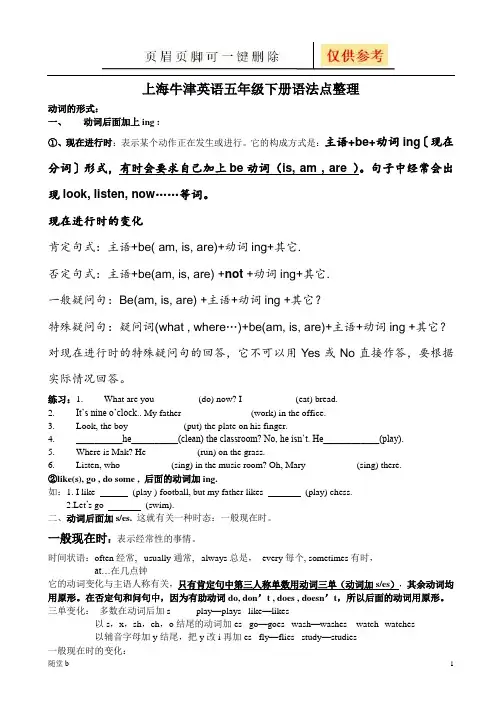
上海牛津英语五年级下册语法点整理动词的形式:一、动词后面加上ing :①、现在进行时:表示某个动作正在发生或进行。
它的构成方式是:主语+be+动词ing〔现在分词〕形式,有时会要求自己加上be动词(is, am , are )。
句子中经常会出现look, listen, now……等词。
现在进行时的变化肯定句式:主语+be( am, is, are)+动词ing+其它.否定句式:主语+be(am, is, are) +not +动词ing+其它.一般疑问句:Be(am, is, are) +主语+动词ing +其它?特殊疑问句:疑问词(what , where…)+be(am, is, are)+主语+动词ing +其它?对现在进行时的特殊疑问句的回答,它不可以用Yes或No直接作答,要根据实际情况回答。
练习:1. What are you _________(do) now? I ___________(eat) bread.2. It’s nine o’clock.. My father_______________(work) in the office.3. Look, the boy____________(put) the plate on his finger.4. __________he__________(clean) the classroom? No, he isn’t. He____________(play).5. Where is Mak? He___________(run) on the grass.6. Listen, who___________(sing) in the music room? Oh, Mary___________(sing) there.②like(s), go , do some , 后面的动词加ing.如:1. I like (play ) football, but my father likes (play) chess.2.Let’s go (swim).二、动词后面加s/es. 这就有关一种时态:一般现在时。
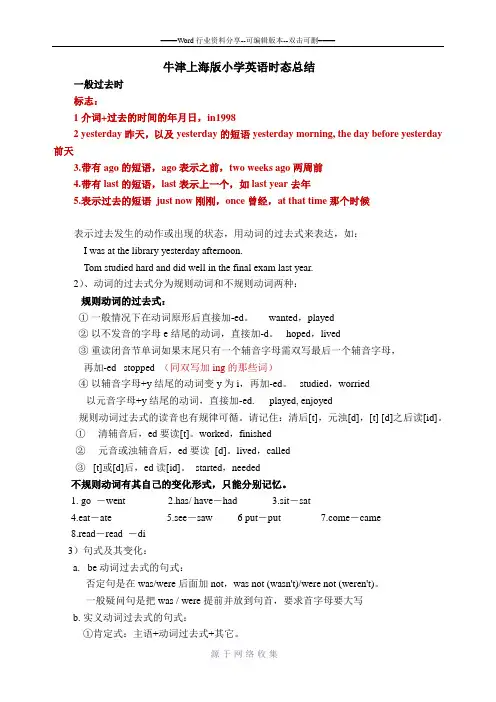
牛津上海版小学英语时态总结一般过去时标志:1介词+过去的时间的年月日,in19982 yesterday昨天,以及yesterday的短语yesterday morning, the day before yesterday 前天3.带有ago的短语,ago表示之前,two weeks ago两周前4.带有last的短语,last表示上一个,如last year去年5.表示过去的短语just now刚刚,once曾经,at that time那个时候表示过去发生的动作或出现的状态,用动词的过去式来表达,如:I was at the library yesterday afternoon.Tom studied hard and did well in the final exam last year.2)、动词的过去式分为规则动词和不规则动词两种:规则动词的过去式:①一般情况下在动词原形后直接加-ed。
wanted,played②以不发音的字母e结尾的动词,直接加-d。
hoped,lived③重读闭音节单词如果末尾只有一个辅音字母需双写最后一个辅音字母,再加-ed stopped (同双写加ing的那些词)④以辅音字母+y结尾的动词变y为i,再加-ed。
studied,worried以元音字母+y结尾的动词,直接加-ed. played, enjoyed规则动词过去式的读音也有规律可循。
请记住:清后[t],元浊[d],[t] [d]之后读[id]。
①清辅音后,ed要读[t]。
worked,finished②元音或浊辅音后,ed要读[d]。
lived,called③[t]或[d]后,ed读[id]。
started,needed不规则动词有其自己的变化形式,只能分别记忆。
1. go -went2.has/ have-had3.sit-sat4.eat-ate5.see-saw 6 put-put e-came8.read-read -di3)句式及其变化:a. be动词过去式的句式:否定句是在was/were后面加not,was not (wasn't)/were not (weren't)。
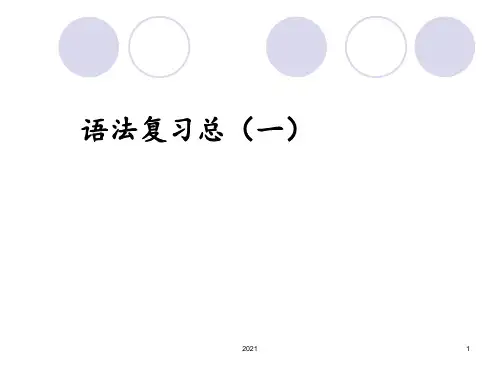
上海牛津英语五年级下册语法点整理的形式:一、后面加上ing :①、在行:表示某个作正在生或行。
它的构成方式是:主 +be+ing〔在分〕形式,有会要求自己加上be ( is, am , are )。
句子中常会出look, listen, now⋯⋯等。
在行的化肯定句式:主 +be( am, is, are)+ing+ 其它 .否定句式:主 +be(am, is, are) + not +ing+ 其它 .一般疑句: Be(am, is, are) + 主 +ing + 其它?特殊疑句:疑 (what , where ⋯)+be(am, is, are)+ 主 +ing + 其它?在行的特殊疑句的回答,它不可以用Yes 或 No 直接作答,要根据情况回答。
: 1.What are you _________(do) now? I ___________(eat) bread.2.It ’ s nine o’. clockMyfather._______________(work) in the office.3.Look, the boy____________(put) the plate on his finger.4.__________he__________(clean) the classroom? No, he isn’ t. He____________(play).5.Where is Mak? He___________(run) on the grass.6.Listen, who___________(sing) in the music room? Oh, Mary___________(sing) there.② like(s), go , do some , 后面的加 ing.如: 1. I like(play ) football, but my father likes(play) chess.2.Let’s go(swim).二、后面加s/es. 就有关一种:一般在。
语法及练习1 be动词Be 动词的用法:(1) Am--was Is --was Are--were 口诀:我用am, 你用are, is用在他她它,复数全用are。
(2) 肯定和否定句I am (not) from London. He is(not) a teacher. She is(not) in the dining room. My hair is(not) long. Her eyes are(not) small.(3) 一般疑问句Am I a Chinese? Yes, you are. No, you aren’t. Are they American? Yes, they are. No, they aren’t. Is the cat fat? Yes, it is. No, it isn’t.用恰当的be动词填空。
1. I ______ a boy. ______ you a boy? No, I _____ not.2. The girl______ Jack's sister.3. The dog _______ tall and fat.4. The man with big eyes _______ a teacher.5. ______ your brother in the classroom?6. Where _____ your mother? She ______ at home.7. How _______ your father?8. Mike and Liu Tao ______ at school.9. Whose dress ______ this?10. Whose socks ______ they?11. That ______ my red skirt.12. Who ______ I?13.The jeans ______ on the desk.14. Here ______ a scarf for you.15. Here ______ some sweaters for you.16. The black gloves ______ for Su Yang.17. This pair of gloves ______ for Yang Ling.18. The two cups of milk _____ for me.19. Some tea ______ in the glass.20. Gao shan's shirt _______ over there.21. My sister's name ______Nancy.22. This ______ not Wang Fang's pencil.23. ______ David and Helen from England?24. There ______ a girl in the room.25. There ______ some apples on the tree.26. _______ there any kites in the classroom?27. _______ there any apple juice in the bottle?28. There _______ some bread on the plate.29. There _______ a boy, two girls, three men and ten women in the park.30. You, he and I ______ from China.语法及练习2 人称代词和物主代词人称代词和物主代词1.人称代词主格和宾格的区别:主格通常位于句中第一个动词之前(有时候位于than 之后),宾格一般位于动词或介词之后。
沪教版四年级英语下册(上海牛津4B)知识点总结知识点总结单词表Module 1 Using my five sensesU 1Touch and feeltouch碰;触摸XXX摸起来;感到soft柔软的hard坚硬的thick厚的;粗的XXX薄的;细的blind瞎的;失明的noise响声;吵闹声young年轻的U 2Smell andXXXsmell闻;嗅strawberry草莓or或者;还是watermelon西瓜grape葡萄fox狐狸round圆的purple紫色的wait期待;等待minute一会儿;分钟get得到those那些U 3Look and see rise升起shadow影子noon中午high高的sky天空evening薄暮;早晨XXX再;又night夜晚moon月亮him他stop停下XXX在中午go down落下XXX在夜晚take a walk漫步Module 2 My favourite things U 4 Subjectssubject学科;科目lesson课Chinese(学科)语文U5 Sportsport体育运动football足球XXX;兴趣小组U 6 Musicwonderful使人愉快的violin小提琴guitar吉他Maths(学科)数学English(学科)英语Science(学科)科学PE(学科)体育Music(学科)音乐Art(学科)美术timetable课程表;时间表from从;来自a.m.上午p.m.下午break休息from…to…从…到…XXX参加;加入tell告诉about关于basketball篮球volleyball排球us我们XXX乒乓球运动play football踢足球play XXX打篮球play volleyball打排球whose谁的piano钢琴city城市bag袋子gold金子all一切;以是play the XXX琴play the guitar弹吉他Module 3 My colourful life Unit 7 My dayo’clock …点钟XXX一刻钟time工夫half一半wash洗dinner晚饭;正餐start入手下手catch抓住get up起床Unit 8 Days of the week week星期XXXwith和…….一同XXX礼拜二XXX星期三XXX星期四XXX礼拜五game游戏XXX星期六Unit 9 XXX inAustraliaChina中国XXX说话May蒲月XXX六月January一月XXXMarch三月April四月XXX七月XXX…XXX 刷牙half past………点半have XXX吃早餐go to school去上学wash…face洗脸have XXX吃午餐have XXX吃晚餐go to bed上床睡觉Sunday星期日clock时钟;钟play chess下国际象棋at XXX在周末(be) late for早退XXX八月XXX九月October十月XXX十一月XXX十二月email电子邮件hat帽子wear穿;戴XXX你的;你们的every year每年Module 4 XXX Unit 10 My gardenXXX花圃plant植物leaf叶子water给……浇水them他们;她们;它们grow发展;发展seed种子every day每天Unit 11 Children’s day song歌曲zoo动物园cinema片子院XXXalso也;还have a party举行集会Unit 12 TheXXXugly丑的;丑陋的duckling小鸭duck鸭子river江;河baby宝宝later厥后;当前quack(鸭叫声)嘎嘎back背;背部XXX去别处swan天鹅into朝;向;到……内里语法复1.量词的用法XXX.XXX juice.2.选择疑问句和一般疑问句的区别(1)普通疑问句Isthekite redandblue?(这鹞子是蓝白色的吗?)普通疑问句的回覆必需Yes或No开首Yes。
∙一般情况下,直接加s 如:read-reads,swim-swims∙以s,x,sh,ch,o结尾,加es 如:wash-washes,watch-watches,do-does ∙以辅音字母+y结尾,变y为i,再加es 如:study-studies,fly-flies∙不规则变化如:have-has4、一般现在时的句型转换:肯定句否定句一般疑问句及回答They watch TV every day.They don’t watch TVevery day.—Do they watch TV every day?—Yes, they do. / No, they don’t.She watches TV She doesn’t watch— Does she watch TV every day?every every day.—Yes, she does. / No, she doesn’t.现在进行时1、定义:表示现在或现阶段正在进行或发生的动作。
句中常有now,look,listen等词。
如:I am washing clothes now.Look! Liu Tao is climbing the tree.Listen! Jane is singing in the music room.2、构成:be动词(am/is/are)+ 动词现在分词(V-ing)3、动词现在分词构成:∙一般是在动词原形后加ing如:read-reading,drink-drinking,eat-eating,look-looking∙以不发音的e结尾的动词,去掉e,再加ing如:write-writing,make-making,ride-riding,take-taking∙以重读闭音节结尾,如末尾只有一个辅音字母,要双写这个字母,再加ing如:sit-sitting,swim-swimming,put-putting,run-running,stop-stopping,get-getting,begin-beginning,jog-jogging,forget-forgetting4、动名词其实就是动词的现在分词,它既有名词性质(可作主语),又有动词性质(可带宾语)。
如:Asking the wayMy hobby is collecting stamps.He is good at skating.5、现在进行时的句型转换:肯定句否定句一般疑问句及回答—Is he running now?He is running now.He isn’t running now.—Yes, he is. / No, he isn’t.They are making a puppet.They aren’t making a puppet.— Are they making a puppet?—Yes, they are . / No, they aren’t .∙一般在动词原形末尾加ed 如:play-played ,listen-listened ,look-looked∙结尾是e 的动词,加d 如:live-lived ,like-liked ,taste-tasted∙辅音字母+y 结尾的动词,变y 为i ,再加ed 如:study-studied ,carry-carried ,cry-cried∙末尾只有一个辅音字母的重读闭音节词,双写这个辅音字母,再加ed 如:stop-stopped ,plan-planned∙不规则变化 如: am/is-was are-were have/has-had do-did go-went sit-sat tell-told see-saw get-got make-made give-gave read-read buy-bought come-came draw-drew eat-ate fly-flew meet-met put-put run-ran say-said sing-sangswim-swamtake-took4、一般过去时的句型转换肯定句否定句一般疑问句及回答He watched TV yesterday.He didn’t watch TV yesterday.—Did he watch TV yesterday?—Yes, he did. / No, he didn’t.They played games just now.They didn’t play games justnow.— Did they play games just now?—Yes, they did. / No, they didn’t.一般将来时1、定义:表示将要发生的动作或存在的状态,以及打算、计划或准备某事。
句中一般含有表示将来的时间状语,如:tomorrow morning,next week,this afternoon等表示将来的时间状语。
2、构成:①be gong to +动词原形如:I am going to see a Beijing opera tomorrow.We are going to meet at bus stop at half past ten.Dad and I are going to see a Beijing opera this afternoon.②will +动词原形如:They will go swimming this afternoon.3、be going to 和will 区别:①be going to表示经过事先安排、打算或决定要做的事情,基本上一定会发生;will则表示有可能去做,但不一定发生,也常表示说话人的临时决定。
如:I am going to take part in a party this evening.They are cleaning the library now. I’ll go and join them.②be going to表示近期或眼下就要发生的事情;will表示的将来时间则较远一些。
如:He is going to write a letter tomorrow. I will meet her one day.③be going to还可以用来表示有迹象表明某件事将要发生,常用于天气等自然现象。
如:Look! It’s going to rain.4、一般将来时句型转换:肯定句否定句一般疑问句及回答She is going to have a picnic tomorrow.She isn’t going to have apicnic tomorrow.—Is she going to have a picnictomorrow?—Yes, she is. / No, she isn’t.They will go swimming this afternoon.They will not(won’t) goswimming this afternoon.—Will they go swimming thisafternoon?—Yes, they will. / No, theywon’t.句法1、陈述句说明事实或陈述说话人观点的句子。
基本结构:主语+谓语+其他1)肯定陈述句 We all like pandas very much.2)否定陈述句 He doesn’t do housework at weekends3)肯定陈述句改否定陈述句①一般是在be动词或情态动词后加not。
Mary was at school yesterday. —> Mary was not at school yesterday.I can make a model plane. —>I can not make a model plane.②不含be动词或情态动词的,行为动词前要用助动词的否定式(don’t,doesn’t,didn’t),后面跟动词的原形。
He likes drawing pictures.—>He doesn’t like drawing pictures.I went to the park yesterday. —>I didn’t go to the park yesterday.4)陈述句改一般疑问句①有be动词或情态动词的,把be动词或情态动词提前。
Mary was at school yesterday. —> Was Mary at school yesterday?I can make a model plane. —> Can you make a model plane?②不含be动词或情态动词的句子,借助助动词开头,动词还原成原形。
He likes drawing pictures.—>Does he like drawing pictures.I went to the park yesterday. —>Did you go to the park yesterday?2、疑问句用来提出问题,询问情况的句子,末尾用问号。
1)一般疑问句:一般疑问句常用来询问一件事是否属实,通常以be动词,助动词或情态动词开头,用yes 或no来回答,因此又叫是非疑问句,通常读升调。
—Is Mr Green from the UK? —Yes,he is. / No,he isn’t.—Do you have any hobbies? —Yes,I do. / No,I don’t.—Can you play the guitar? —Yes,I can. / No,I can’t.2)特殊疑问句:以特殊疑问词引导,要求回答具体问题,不能用yes或no来回答。
—How do you go to work every day? —I go to work by car.3)选择疑问句:提供两种或两种以上情况,让对方选择,往往用or连接。
—Would you like some tea or coffee? —Some coffee, please.4)反意疑问句:反意疑问句是由陈述句和附在其后的附加疑问句组成。
—It’s a fine day, isn’t it? — Yes ,it is.3、祈使句表示请求或命令别人做某事或不做某事。
1)用于第二人称,通常省略you。
①肯定祈使句:Open the door, please.②否定祈使句:Don’t be late again.2)用于第一人称和第三人称,通常以let(let后跟宾格)或shall开头。